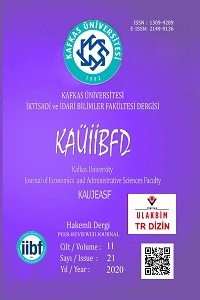REGIONAL AND HEGEMONIC IMAGE OF THE UNITED STATES: ANALYSIS OF TURKISH AND FOREIGN STUDENTS’ US PERCEPTION THROUGH TWO MOVIES
Abstract
The aim of this study is to understand
and explain how the US instrumentalizes and perceives cinema for its own
hegemonic policies. The scope of our study is limited to dichotomical
comparisons which have an important place in the hegemonic policies of USA. Our
work is a qualitative one and is based around two Hollywood films. In this
context, interviews and focus group interviews were conducted with Turkish and
foreign, Muslim and Christian students and their opinions about two Hollywood
productions were analyzed and the data obtained were analyzed within the
framework of descriptive analysis and thematic analysis methods. The data
obtained from the students participating in the study give an idea of how
educated young people evaluate, perceive and use the relationship between
cinema films and the global hegemony of the USA. In this sense, the results of
our study, the use of cinemanion in the presentation of the United States and
how the situation is perceived and understood by young people from different
regions, countries, religions and ethnicities is trying to make a valuable contribution
to the global and hegemonic policies that have been rarely seen in Turkish
literature.
References
- Baumann, Z. and Tim May (2001). Thinking Sociologically. UK: Wiley-Blackwell.
- Brown, P. M. ve Turner, J. C. (2002). “The Role of Theories in the Formation of Stereotype Content”. In Craig McGarty, Vincent Y. Yzerbyt, Russell Spears (Der.).
- Stereotypes as Explanations: the Formation of Meaningful Beliefs About Social Groups. (Cambridge: Cambridge University Press. Pp:67-89
- Kellner, D. (2010). Cinema Wars: Hollywood Film and Politics in the Bush-Cheney Era. UK: Wiley-Blackwell.
- McLeod, S. (2008). Social Identity Theory. Available at: www.simplypsychology.org/social-identity-theory.html. Access Date: 15.02.2018.
- Merriam, S. (2015). Qualitative Research: A Guide to Design and Implementation. UK: Wiley-Blackwell.
- Robson, C. and McCartan, K. (2016). Real World Research. UK: Wiley-Blackwell.
- Yin, R. (2009). Case Study Research: Design and Methods. London: Sage Publication.
Details
| Primary Language | English |
|---|---|
| Journal Section | Articles |
| Authors | |
| Publication Date | June 30, 2020 |
| Acceptance Date | February 21, 2020 |
| Published in Issue | Year 2020 Volume: 11 Issue: 21 |
KAUJEASF is the corporate journal of Kafkas University, Faculty of Economics and Administrative Sciences Journal Publishing.
KAUJEASF has been included in Web of Science since 2022 and started to be indexed in the Emerging Sources Citation Index (ESCI ), a Clarivate product.

